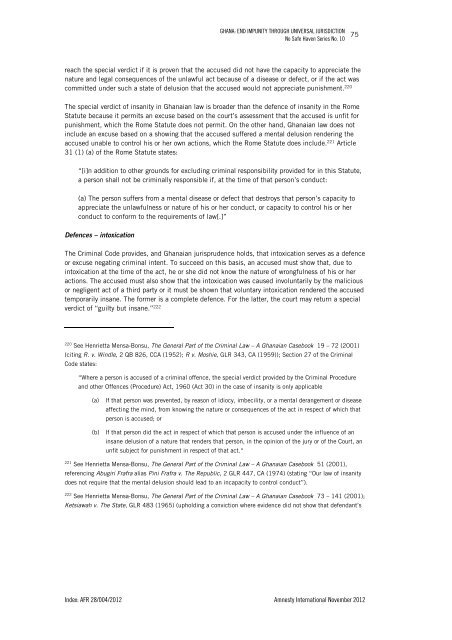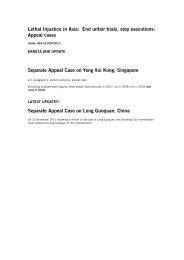Ghana - Amnesty International
Ghana - Amnesty International
Ghana - Amnesty International
You also want an ePaper? Increase the reach of your titles
YUMPU automatically turns print PDFs into web optimized ePapers that Google loves.
GHANA: END IMPUNITY THROUGH UNIVERSAL JURISDICTIONNo Safe Haven Series No. 1075reach the special verdict if it is proven that the accused did not have the capacity to appreciate thenature and legal consequences of the unlawful act because of a disease or defect, or if the act wascommitted under such a state of delusion that the accused would not appreciate punishment. 220The special verdict of insanity in <strong>Ghana</strong>ian law is broader than the defence of insanity in the RomeStatute because it permits an excuse based on the court’s assessment that the accused is unfit forpunishment, which the Rome Statute does not permit. On the other hand, <strong>Ghana</strong>ian law does notinclude an excuse based on a showing that the accused suffered a mental delusion rendering theaccused unable to control his or her own actions, which the Rome Statute does include. 221 Article31 (1) (a) of the Rome Statute states:“[i]n addition to other grounds for excluding criminal responsibility provided for in this Statute,a person shall not be criminally responsible if, at the time of that person’s conduct:(a) The person suffers from a mental disease or defect that destroys that person’s capacity toappreciate the unlawfulness or nature of his or her conduct, or capacity to control his or herconduct to conform to the requirements of law[.]”Defences – intoxicationThe Criminal Code provides, and <strong>Ghana</strong>ian jurisprudence holds, that intoxication serves as a defenceor excuse negating criminal intent. To succeed on this basis, an accused must show that, due tointoxication at the time of the act, he or she did not know the nature of wrongfulness of his or heractions. The accused must also show that the intoxication was caused involuntarily by the maliciousor negligent act of a third party or it must be shown that voluntary intoxication rendered the accusedtemporarily insane. The former is a complete defence. For the latter, the court may return a specialverdict of “guilty but insane.” 222220See Henrietta Mensa-Bonsu, The General Part of the Criminal Law – A <strong>Ghana</strong>ian Casebook 19 – 72 (2001)(citing R. v. Windle, 2 QB 826, CCA (1952); R v. Moshie, GLR 343, CA (1959)); Section 27 of the CriminalCode states:“Where a person is accused of a criminal offence, the special verdict provided by the Criminal Procedureand other Offences (Procedure) Act, 1960 (Act 30) in the case of insanity is only applicable(a)If that person was prevented, by reason of idiocy, imbecility, or a mental derangement or diseaseaffecting the mind, from knowing the nature or consequences of the act in respect of which thatperson is accused; or(b) If that person did the act in respect of which that person is accused under the influence of aninsane delusion of a nature that renders that person, in the opinion of the jury or of the Court, anunfit subject for punishment in respect of that act.“221See Henrietta Mensa-Bonsu, The General Part of the Criminal Law – A <strong>Ghana</strong>ian Casebook 51 (2001),referencing Abugiri Frafra alias Pini Frafra v. The Republic, 2 GLR 447, CA (1974) (stating “Our law of insanitydoes not require that the mental delusion should lead to an incapacity to control conduct”).222See Henrietta Mensa-Bonsu, The General Part of the Criminal Law – A <strong>Ghana</strong>ian Casebook 73 – 141 (2001);Ketsiawah v. The State, GLR 483 (1965) (upholding a conviction where evidence did not show that defendant’sIndex: AFR 28/004/2012 <strong>Amnesty</strong> <strong>International</strong> November 2012
















